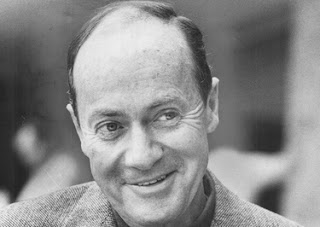Ross MacDonald is a mystery author who specialized in the private-eye novel. His series character (18 books) is the low-key Lew Archer (Archer from Hammet's Maltese Falcon). He began writing in the late forties and gradually his books became more popular until eventually in the seventies he became a best-selling author. Hollywood adapted two of his books into movies featuring Paul Newman.
Initially, Millar began writing in the style of Raymond Chandler - short, snappy prose with quick violence and starkly realized characters. But over the years (and after much psychotherapy) he developed his own, low-key style which emphasized empathy (on Lew Archer's part) for the characters and the terrible things they do. It's not about vengeance or justice with Archer, but humanity. Themes of identity, family dissolution and money are common in the second half of his career. He also used events in his life as elements of his plots. He transposed events and re-imagined them. You could say that he was trying to work out his feelings about his life events through his later novels.
He is the doorway for authors like Joseph Hansen, Sue Grafton and Sara Paretsky. His novels showed that you didn't have to play to violence and cliche to create compelling mysteries. There are those who say that he made the mystery form into literature. I don't believe that, but he did "deepen" the quality of the mystery novel and put the emphasis on character. He was a master writer whose legacy is still being appreciated.
SHOW NOTES
This podcast features a short biography of Ross MacDonald (Kenneth Millar), an even shorter paperback history of his books, and a longish discussion of his key work, Black Money (1966), with fellow podcaster Richard Brewer.
I primarily used the Tom Nolan biography, the Twayne series of author studies on Ross MacDonald by Bernard A. Schopen, and a fascinating study of Ross MacDonald and his Novels, and Dreamers Who Live Their Dreams by Peter Wolf.
There are also some wonderful articles and pages devoted to Ross MacDonald his series character, Lew Archer. My favorites include killercoversoftheweek, CrimeLit, and Tom Nolan's Gatsby as Noir: The Genesis of Ross MacDonald's 'Black Mondy".
There's a very enjoyable documentary on Kenneth Millar created in the mid-seventies for the "Writers in America" series. You can view it on YouTube. It's silly at times, but it has some excellent sequences of Millar swimming in the ocean and writing in his chair using a board across the arms and a yellow legal tablet. You can find the documentary here.
Black Money in Paperback.
Bantam reprinted MacDonald the most. Pretty much every decade they would come out with a new series of reprints with a unique cover design. Google individual novels for their covers. I'll focus on our highlighted title, Black Money.
Ross MacDonald Paperback Covers
It seemed like every decade Bantam would roll out a new cover design for the series. They varied wildly from straight graphics to staged photos. These are the American paperbacks I'm referring to. The UK-published paperback versions were mostly photo collages (and not very good). Early Pocket and Dell paperbacks had typically painted covers that mostly looked like every other paperback on the market. The current series of trade paperbacks by Random House uses typical staged photos but are well-designed graphically.
A good reference for these changing cover styles by Bantam is the CrimeLit article by J. Kingston Pierce: Ross MacDonald's 'Moving Target", A History in 25 covers. He even includes non-English paperback publications.
SPECIAL GUEST RICHARD BREWER
My co-host on this episode is a long-time mystery reader. We first met while working at the Mysterious Bookshops back in the 90s. He is also an audiobook director having recently completed the novels of Raymond Chandler as audiobooks. Check out his Facebook page. The Chandler audiobooks (narrated by Scott Brick) can be found here.
Richard mentioned the Raymond Chandler series he directed for Audible. You can find those recordings here. He recently finished narrating a Bart Hall western noir book for Audible called Under Tower Peak. The anthology Culprits: The Heist Was Only the Beginning that Richard and Gary Phillips edited can be found here.


